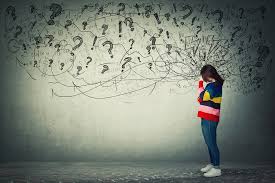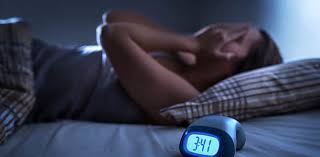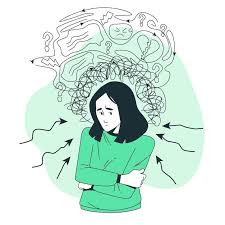In this paced world, mental health issues like depression, anxiety, and OCD(Obsessive-compulsive disorder) are seen in increased numbers and have become more common among people. These conditions can notably affect someone's everyday life, relationships, and daily lifestyle. In this blog, we will understand depression, anxiety, and OCD and how they affect people.
Depression: The Heavy Cloud of Sadness.
Depression is an awful thing more than simply feeling unhappy or down. It's a critical mental health condition characterized by the presence of emotions like sadness, hopelessness, and lack of interest in the things you liked before. Nowadays from teenagers to people in adulthood, every age group people are going through depression due to studies, work pressure, relationship issues, etc.

People with depression might also experience symptoms such as:
1)Disappointment:
Feeling down most of the time, often without any particular reason.
2)Loss of interest:
Losing interest in things that were mostly interesting before or loss of interest in social interactions.
3)Fatigue and low energy:
Feeling constantly tired, even after a full night time's sleep.
4)Changes in appetite or weight:
Eating too much or too little leads to weight benefit or loss.
5)Sleep disturbances:
Difficulty falling asleep, staying asleep, or oversleeping.
6)Feelings of worthlessness or guilt:
Believing that they are worthless is also a symptom of depression.
7)Difficulty concentrating:
People with depression can not concentrate on a particular thing for a long time.
Depression can vary in severity, from moderate to intense, and might have a considerable impact on someone's capacity to think and function well.
Anxiety: The Overwhelming Fear
Anxiety is a natural response to stress or trauma but for a few people, it turns into a hectic mental issue, interfering with their day-to-day life. Imagining or feeling constantly that something horrible is about to happen, even if there is no such situation.

Common signs and symptoms of anxiety are as follows:
1)Excessive worry:
Feeling worried about things that are not even considerable.
2)Restlessness:
Feeling stressed and restless even though without any work.
3)Physical signs and symptoms:
Experiencing physical symptoms like a speedy heartbeat, sweating, shivering, or breathing issues.
4)Difficulty concentrating:
Finding it difficult to focus or give attention due to multiple thoughts.
5)Sleep disturbances:
Difficulty falling asleep or having more sleep than in general.
6)Panic attacks:
Sudden, severe panic attacks, followed by signs like chest ache, dizziness, or nausea.
Obsessive-Compulsive Disorder (OCD): The Cycle of Obsessions and Compulsions
OCD is a mental health condition characterized by unwanted thoughts that lead to repetitive or compulsive behaviors.OCD is mainly characterized by having the urge to have cleanliness in self and others.
Common symptoms of OCD include:
1)Fear of microbes:
Having fear of germs or infection, mainly due to over-washing or self-cleaning habits.
2)Fear of harming self or others.
Repeated slow talking with self when there is no one around.
3)Repetitive behaviors or mental acts due to the compulsion they have in their mind.
4)Excessive handwashing, cleaning, and grooming in fear of germs.
5)Feelings such as shame, guilt, or embarrassment about the repetitive compulsions.
The treatment procedure for depression, OCD, and Anxiety:
Although depression, anxiety, and OCD have similar symptoms all of them come under mental health issues. So, their treatment is also similar based on the severity of the problem treatment is given. Soon after you see any of the above symptoms as mentioned above you need to consult a psychiatrist who can help you with the issue. So the most common methods of treatment include:
1)Behavioral therapy is given to people who are going through depression, anxiety, and OCD to reduce their stress feelings of hopelessness, and irrational thoughts. The therapy helps them to learn to cope with the situation and manage their anxiety.
2)Medications such as antidepressants are prescribed to reduce depressed feelings and regulate their brain functioning as before. Based on the requirement and medical condition of the patient the dosage is given as high dose medication can disrupt the brain functioning.
3)Certain lifestyle adjustments such as regular exercise, yoga, meditation, and healthy diet habits can add some positivity to the person’s mind resulting in healthy well-being.
Depression, anxiety, and OCD are the most seen mental health issues which are being seen in most people in recent days however little management and treatment procedures can help you with the problems but may lead to severe complications if left untreated.
